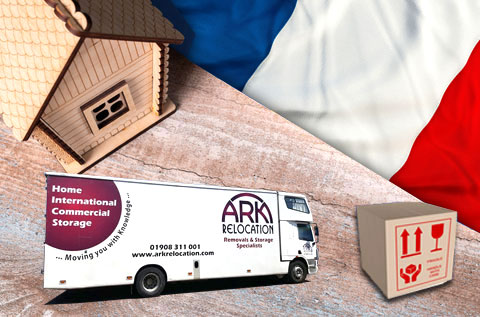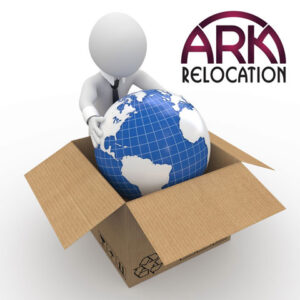Since the UK is not a European Union member any longer, there is a bit of good news you should know about when it comes to customs duties and French customs and the VAT paid for these items.
The rules slightly differ, which will depend on if you plan to move household goods to your primary residence in France or you plan to move goods to a “second” residence in France.
These days are still early with the implementation of different custom practices from France to the UK, but the evidence at this stage suggests that even the customs officials are still learning the ropes.
What You Need To Know About Moving Goods To A Primary Home In France
If you reside in France or you are relocating to this country, and you plan to bring items to your main home, in principle you will be exempt from having to pay taxes on any personal goods imported.
This exemption will apply to those that have lived in the UK (or any other country outside the EU) for a minimum of 12 months, and you own items (for at least 6 months before the shipping date) you would like to import.
You are required to bring the belongings over that you would like to import within 12 months of your relocation to France. You can also bring them over in a single or several trips.
You are not permitted to rent or sell items for 12 months after you have imported them to France, but how the “all-seeing eye” relating to the French State enforces this particular rule, we are not sure.
When transporting goods you are required to provide 2 copies of a an inventory of goods that lists their value along with a signed declaration.
The detail levels that French customs officials require can vary, with some people reporting that it is sufficient to merely list boxes by their categories such as garden equipment, kitchen equipment, etc.
You are also required to produce documentation that proves you resided in the UK and you are now moving to France. A tax or rates bill is usually sufficient to provide proof of residency in the UK, while proof of a Notaire certificate of ownership, a utility contract or bill, or a property deeds certificate should suffice.
Some people have also mentioned that you will need a “certificate” that confirms a “change of address”, which is a requirement that appears to come from Douane (a French Customs Authority Website) which references a “change of residence certificate”.
However, after contacting the French Consulate in London, they didn’t sound interested at all in issuing these forms but instead stated we needed a visa. At the same time, the French version of the Douane website only states that you need to provide a “tout document pouvant démontrer le changement de résidence”.
Strictly speaking, you might also be asked to provide documentation (like receipts) that prove you own the items (for more than 6 months) that you are wishing to import. This is easy to accomplish with one of the signed statements known as a “certificat de non-cession”, which confirms that all the items belong to you.
There are countless examples of these forms online that many removal companies use. Once again, as long as you are only planning to bring standardised loads of household goods over to France, and it is evident that you are moving home, it is unlikely that customs officials are going to ask you for a receipt for each item. Only when you own highly valuable pieces it may be useful that you carry evidence that you own these items.
In France, border officials will use x-ray equipment to inspect vehicles when necessary. This means that the contents of loads are easy to examine should they decide to do so.
Certain items may not be included in the tax exemptions. These often include items that are typically for “commercial use” like raw materials, tobacco, alcohol, or professional goods.
There are also specific controls in place when it comes to importing plant products and plants which can be found in Export Plant Products And Plants From Northern Ireland And Great Britain. These apply equally to second-home owners and visitors.
What You Need To Know About Moving Goods To A Second Home In France
VAT and customs duties are required on any goods that you bring over permanently to your second property in France. The Douane website confirms this in French.
However, when you travel to France in person you are allowed to bring luggage that won’t be subjected to VAT. There are no specific allowances on this except that the “amount or nature of the items in your baggage cannot imply commercial purposes”.
So this will also have to do with the customs officials and their discretion at a port, although what has become evident to date (in the midst of the pandemic) is that light touches are being applied.
In your luggage, you are allowed to carry items gifted or purchased in the UK to a value of €300 when traveling by train or car that you won’t have to declare at customs. This will rise to €430 for the passengers that arrive by air or sea, and kids are allowed to carry goods up to the value of €150 in their luggage.
Goods that exceed these limitations have to be declared. You will also be charged 20% VAT on the value that exceeds this threshold, along with customs duties when they apply.
However, when the items you are traveling with in your luggage are within a value of €300/€430/ €150 and €1,200 and produced in the UK, they might be exempted from “custom duties” (but not VAT thanks to the cooperation and trade agreement between the UK and the EU).
In these cases, verbal declarations are enough at customs. Goods that exceed €1,200 (made in the UK) might also be exempted from “custom duties” but proof in writing of where they originate from is required.
When transporting goods you must bring 2 copies of the furniture listing and inventory of goods, their value, and documentation that proves you own a home in France, along with a “signed declaration”.
You can use your own valuation for your goods and whether the customs officials will accept it or not. We haven’t heard of reports of officials refusing these valuations.
You also have the option of declaring goods with French customs two days before you travel online.
If you have inherited goods they might be exempted from fees and taxes provided you plan to move to France within 2 years (of receiving them). You will also need a notary to offer proof in these cases.
Household Goods You Are Not Allowed To Bring To France
Some household items are not permitted to travel from the UK to France. Standard custom restrictions will apply when it comes to banning illegal and dangerous items, and the transportation of household plants might also prove to be just as complicated. Importing any milk-based or meat products in all forms is prohibited. Infant food is an exception.
When it comes to importing plants to France from the UK, you have to have a Phytosanitary Certificate from the SIVEP (Veterinary and Phytosanitary Border Inspection Office). Exceptions are often made for small quantity plants for a non-commercial purpose or plants that fit in your baggage.
The definition for “small quantities” has not been specified.
Recommend Using A Removal Company
If you plan to bring over large quantities of items to France or highly valuable items, you most probably would need to use a reliable removal company like Ark Relocation.
Ark Relocation manage all the paperwork on behalf of their customers and have experience when it comes to passing between the different customs in France and the UK. Speak to a member of our team by Call 01908 311 001 or email us on info@arkrelocation.com , see our removals to France page for more info https://www.arkrelocation.com/european/removals-to-france/ Or Get a Free Moving Quote
Additional Information
For any other customs information that you may need, contact the French Customs Helpline on 0 800 94 40 40 from France or +33 1 72 40 78 50 from overseas.
Related Posts

My Story: Gabby Gomes of Ark Relocation
I’m Gabby Gomes, the heart and soul behind Ark Relocation in Milton Keynes. With over three decades in the moving industry, I’ve steered Ark Relocation to be a trusted name, offering everything from house removals to commercial relocations. We’ve also ventured into European and International removals, ensuring seamless transitions for our clients, whether near or far.








